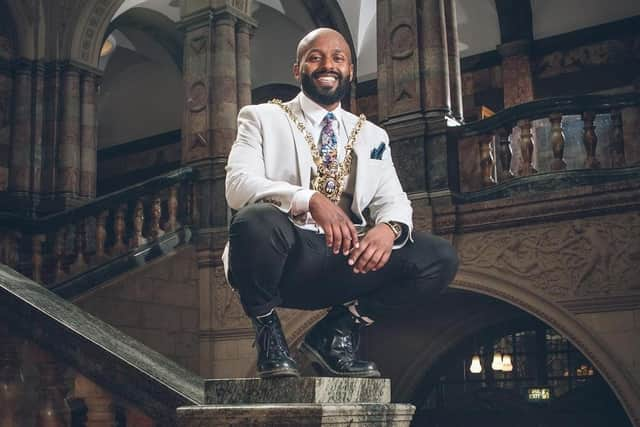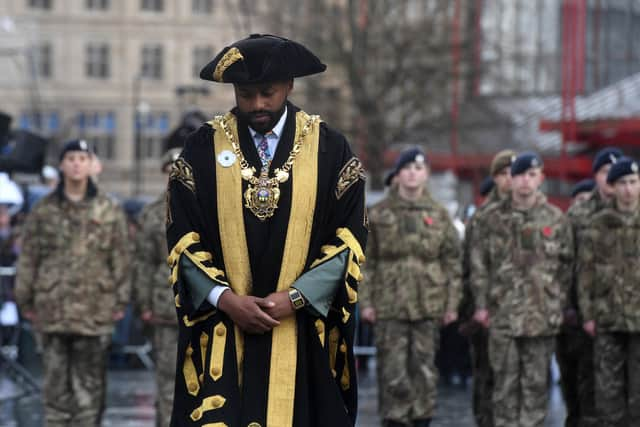Magid Magid on peacocking, racism - and why’s he getting involved with the ‘Festival of Brexit’


In just a few short years he has been a reality TV show contestant, Sheffield’s youngest Lord Mayor and Yorkshire’s first Green Party MEP; now Magid Magid is making another unexpected move.
As we speak over the phone to discuss his new book – a part memoir/part political manifesto called The Art of Disruption – Magid reveals that he has been asked to be a creative advisor for the controversial Festival UK 2022. Designed to celebrate the nation’s creativity and bring people back together after a divisive few years, the Government-backed event – which was originally Theresa May’s idea and has mockingly been dubbed the ‘Festival of Brexit’ by opponents – has been criticised for having a £120m budget at a time when many arts organisations are struggling to survive because of coronavirus.
Advertisement
Hide AdAdvertisement
Hide AdMagid says while he sympathises with that viewpoint, the opportunity was one he felt he couldn’t turn down. “For me it is a case that the festival is happening and it is better to have an influence and a seat at the table than not having a say in it.”


The experience will start another chapter in what has already been an extraordinary journey for Magid, who arrived in the UK with his family at the age of five as a refugee from Somalia.
There aren’t many politicians who would happily admit to being an attention seeker but Magid has made standing out from the crowd something of a trademark. Having missed his inauguration as Deputy Lord Mayor in 2017 as he was away filming the Channel 4 fugitive show Hunted, it was a very different story a year later.
An unforgettable picture marking his inauguration in May 2018 as Sheffield’s Lord Mayor showing him squatting on a marble plinth inside the Town Hall with his official chain, in a three-piece suit and Dr Martens boots went viral – catapulting him to global attention and setting the tone for a year in office that made waves and sharply split opinion.
Advertisement
Hide AdAdvertisement
Hide AdThe then-28-year-old councillor went on to ‘ban’ Donald Trump from Sheffield, wear a white poppy at the city’s official Armistice Service and create a ‘Sheffield’s Ten Commandments’ poster at a music festival that included the instruction ‘Don’t Kiss A Tory’.


Magid’s new book outlines his political theory of ‘peacocking’.
“In a world where there is so much information overload and people have very short attention spans, I would try to grab their attention by being different but I would always have a political message,” Magid explains to me over the phone. “I understood what an amazing opportunity it was to be Lord Mayor. I used to give myself a pep talk before public events and say nobody is going to care in a year’s time. For me, it was about trying to make the most of a golden opportunity every single day.
“After the first photo went viral, it spiralled from there. Had I not done those things and the peacocking, I would not have been able to get people talking about Sheffield. People said I was attention-seeking – well, do you want me to just do nothing, just go away and hide?”
Advertisement
Hide AdAdvertisement
Hide AdHis other innovations during his year in office included declining to have an official consort in line with tradition and instead inviting different members of the public to accompany him to events.


“I wanted to have as many people experience the year with me as possible. It was amazing to get so much love. As difficult as it was at times, it was the biggest privilege to give back to a city that has given me so much. People asked me to walk them down the aisle to get married and anything I could do, I would. I honestly was working so hard.”
But while much of the reception was positive – Magid says he sometimes felt like ‘a bizarre Father Christmas’ as people’s faces would light up when they saw him at an event - there were plenty of people deeply opposed to his approach. In the book, Magid recounts how he ended up creating a ‘hate box’ in the corner of his office which he filled with the dozens of abusive and racist letters he regularly received. He says the far-right English Defence League even ended up creating an internet page for people to post hateful messages about him.
He says the racism he faced did have an impact despite his best attempts to brush it off.
Advertisement
Hide AdAdvertisement
Hide Ad“We are all human at the end of the day and I’m fortunate that I’m thick-skinned and generally just laugh things off. But it did get a bit much when it was from Sheffielders as well. I would regularly feature on EDL pages and I didn’t care but when it was from Sheffield I would think, ‘I’m doing the best I can and I have got the best of intentions’. At times it did get to me.”
He says one of his proudest political achievements as a councillor was getting local bus companies to train their bus drivers on how deal with incidents of passengers being racially abused after having personally witnessed many such incidents himself, along with a lack of action when complaints were made.
As well as abuse from racist extremists, Magid also faced plenty of pushback from political opponents as Lord Mayor.
Midway through his tenure the Labour group which controls Sheffield Council tried and failed to bring in a new code of conduct demanding mayors ‘respect tradition’ – but his book fascinatingly claims there was even more opposition behind the scenes.
Advertisement
Hide AdAdvertisement
Hide AdMagid says a member of the council’s communications department told him their team had been instructed not to get involved with anything he was doing, despite such press office support being offered as standard to previous Lord Mayors.
It also states that Magid was invited to attend the Sheffield football derby alongside council leader Julie Dore and was left “shocked when she told me the number one topic the Labour councillors spent most time talking about in their meetings was not how they were going to tackle homelessness and not what the council should do to support young people or mental health – it was me. I was both baffled and concerned as the Labour group were supposed to be running the city”.
Magid, who first got involved in politics as a student at university in Hull but stepped up his interest after becoming alarmed at Ukip’s success in the 2014 European elections, says his experience of dealing with the Labour-run council was disenchanting given the two parties are meant to be on similar ends of the political spectrum.
Relations between the two parties in Sheffield had already been strained over the council’s controversial handling of mass tree-felling work under a highways contract which saw protesters repeatedly arrested and private security guards deployed. Magid’s Green Party colleague Alison Teal was among a group of demonstrators arrested under part of Trade Union and Labour Relations Act 1992 during a protest in 2017 as part of the long-running dispute.
Advertisement
Hide AdAdvertisement
Hide Ad“Sheffield Labour was using anti-trade union legislation against its own citizens,” says Magid, who grew up as Labour supporter but changed allegiance to the Greens after doing an online quiz which showed his views were more closely aligned with their policies. “I have got a lot of Labour friends and they say they use Sheffield as an example of how not to run a Labour council.”
He feels some Labour councillors did their best to handicap his time as Lord Mayor.
“I gained a lot of soft power as Lord Mayor. When I was getting more attention, it became really party political. They would make it difficult for me to hold events but then end up taking credit for them. It was a majority of Labour councillors but there were some who were really supportive.
“If I had been in the Labour party I would never have been a councillor or ended up as Lord Mayor. Some of my friends who are Labour activists and are amazing don’t get a look in. One thing I found really surprising is all the alliances are based on friendships and not politics.
Advertisement
Hide AdAdvertisement
Hide Ad“They didn’t expect the impact I would make and they didn’t know how to react.
“Some of the Labour councillors said they would never have voted for me as Lord Mayor if they had known what I was going to do.
“One thing I introduced was to showcase a creative talent from Sheffield in each monthly council meeting and allow them to perform something in the council chamber during the break between agenda items.
“Some of the councillors would deliberately go and stand outside waiting for it to finish and come back in - they would complain to the chief executive, saying ‘Why is he doing this?’
Advertisement
Hide AdAdvertisement
Hide Ad“For me, you are not hurting my feelings but you are disrespecting the people who have decided to showcase something. It was so pathetic.
“There are also amazing council officers who do amazing work but in my experience the leadership didn’t want to rock the boat - God forbid anything should change in that place.
“People in Sheffield thought I was the supreme leader of Sheffield. But that was because there was a lack of leadership at the top of the council.
“Because I was willing to put myself out there, people thought I had some sort of magic wand.”
Advertisement
Hide AdAdvertisement
Hide AdOne of his most controversial acts as Lord Mayor was wearing a white poppy on Remembrance Sunday, while the book also reveals that the managing director of Boeing, which was preparing to open its first manufacturing site outside the US on the outskirts of Sheffield, contacted the council to express its disappointment at Magid’s Donald Trump ban.
There is a long pause after I ask him if regrets anything from his time as Lord Mayor. “Honestly, there is nothing I regret,” he says eventually. “I got a lot of hate mail over the white poppy but also people saying even though I disagree with you, I previously didn’t know what the white poppy was to begin with. A lot of people didn’t agree with me but said at least you stood by your principles.”
Another moment of controversy was his ‘Ten Commandments’ poster at the Tramlines music festival and in particular, its instruction not to kiss a Tory. Not only does Magid have no regrets over that - the commandments are used as the structure for his book, with an entire chapter dedicated to his ‘Don’t Kiss A Tory’ advice.
In what he describes as his ‘standing on a soapbox’ chapter, Magid defends his stance on the issue - citing the Windrush scandal, the impact of austerity and plans to introduce an Australian-style immigration system when that nation’s approach has been strongly criticised by Amnesty International over the treatment of asylum seekers.
Advertisement
Hide AdAdvertisement
Hide Ad“That is the least I can say about the Conservative party - there are so many worse things I could say,” he says today. “It was tongue in cheek but it was a bit serious too.
“The majority of people - even Tories - didn’t find it offensive. It was a very small minority of people who made a big hoohah about it.”
After his time as Lord Mayor, Magid went on to be elected as the Greens’ first-ever MEP for Yorkshire and Humber – with a particularly strong showing in Sheffield where the party finished well ahead of Labour and the Liberal Democrats. “The best thing on election night was seeing the result in Sheffield. It felt like 100 per cent vindication of my year as Lord Mayor. For Sheffield to come out the way they did meant the world to me. I knew Labour members in Sheffield supported me, even if the Labour council didn’t.”
But despite being ardently in support of the EU project, both being on the campaign trail and then working in Brussels made Magid critical of some aspects of the institution.
Advertisement
Hide AdAdvertisement
Hide Ad“I remember going on the election trail around Yorkshire and in Todmorden I asked a room full of people for a show of hands of how many people could name their MEP and only one or two could do it. MEPs weren’t engaging with their constituents and if they had done, maybe Brexit wouldn’t have happened.
“When you get to Brussels, it is a massive bubble. I was living in Anderlecht, which is seen as the rough side of Brussels where MEPs won’t stay. People there didn’t have a clue what the European Parliament is and I just though if people in Brussels don’t have a clue, how are people in Barnsley or Barcelona going to be engaged?”
Shortly after being elected, he wrote an article for the Politico website where he criticised MEPs for “burying their heads in the sand” and wrote “I feel as though I’ve left the shores of the real life and stepped into a maze of bureaucracy, needless technicalities and political performance”.
The article was even shared online by the Brexit Party and Magid says he faced heavy criticism over what he had written.
Advertisement
Hide AdAdvertisement
Hide Ad“Pro-Remain people on Twitter lost their s*** with me,” he says. “My view was, guys I still love the EU but I want it to be the best version of it possible.
“There was no room for nuance about the EU project. I can see a lot wrong with the EU but I still believe people voted Leave based on false information. There is a lot more positive from being in the EU than negatives.
“One good thing is every MEP is a legislator - here unless you are in the Cabinet you basically get no say whatsoever. In the European Parliament, you could make a genuine difference and change words in legislation from ‘may’ to ‘will’ for example.
“But with some of the British MEPs I would think, ‘What have you been doing for 10 years?’ I would have done anything to have 12 months there to make a difference.”
Advertisement
Hide AdAdvertisement
Hide AdMagid is now busy with various different projects, including Festival UK 2022, but says he would not rule out standing for election again in future - including potentially for Parliament.
Towards the end of the book, he summarises the approach that has brought him success. “I grew up with the impression you had to be educated at the most prestigious institutions, be a fantastic public speaker and possess huge wealth to get anywhere in politics, but the truth is that the secret is in the sincerity.” Whatever you think of Magid Magid, it is fair to say that is an approach he lives by.
Support The Yorkshire Post and become a subscriber today.
Your subscription will help us to continue to bring quality news to the people of Yorkshire. In return, you’ll see fewer ads on site, get free access to our app and receive exclusive members-only offers.
So, please - if you can - pay for our work. Just £5 per month is the starting point. If you think that which we are trying to achieve is worth more, you can pay us what you think we are worth. By doing so, you will be investing in something that is becoming increasingly rare. Independent journalism that cares less about right and left and more about right and wrong. Journalism you can trust.
Thank you
James Mitchinson
Comment Guidelines
National World encourages reader discussion on our stories. User feedback, insights and back-and-forth exchanges add a rich layer of context to reporting. Please review our Community Guidelines before commenting.